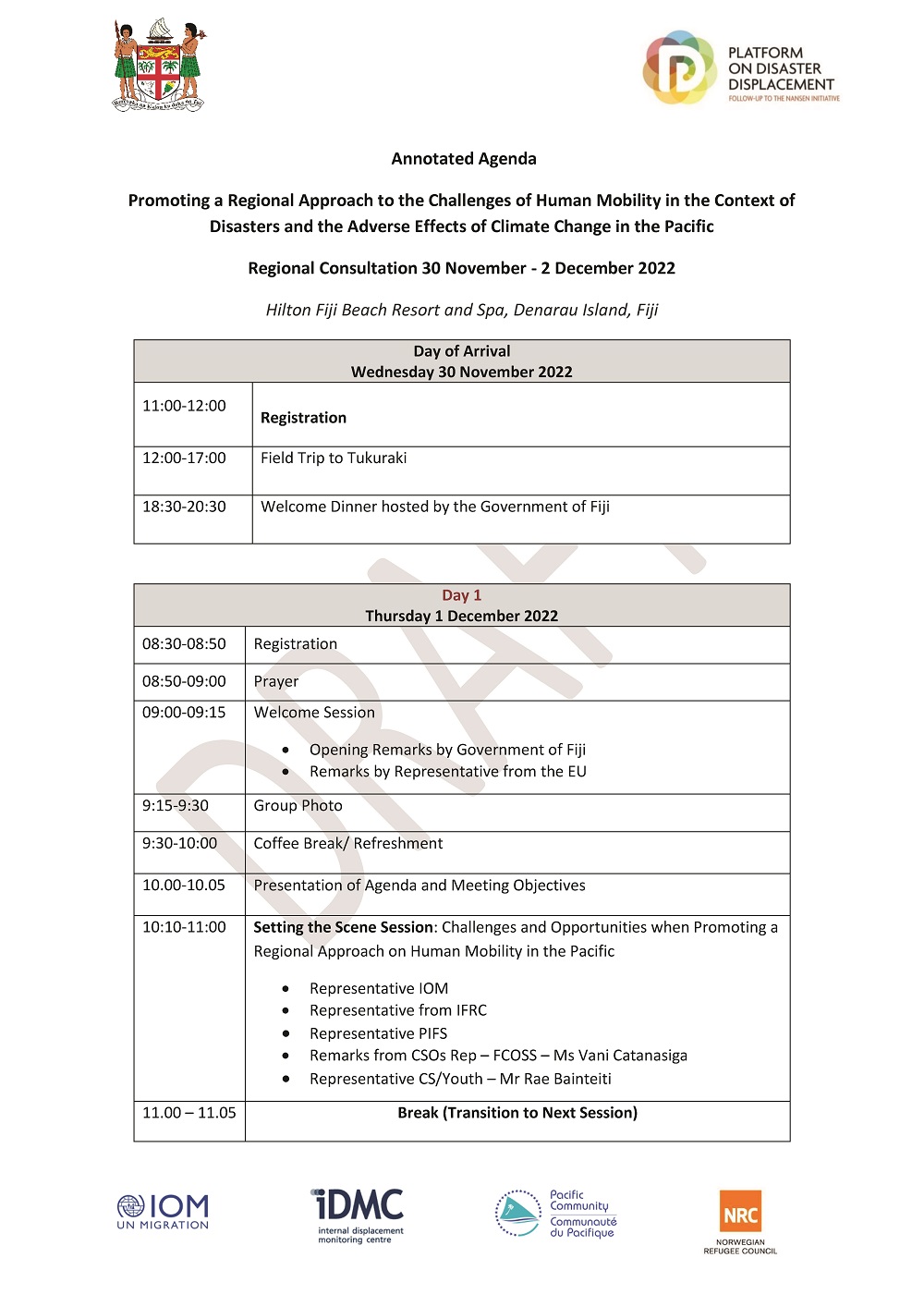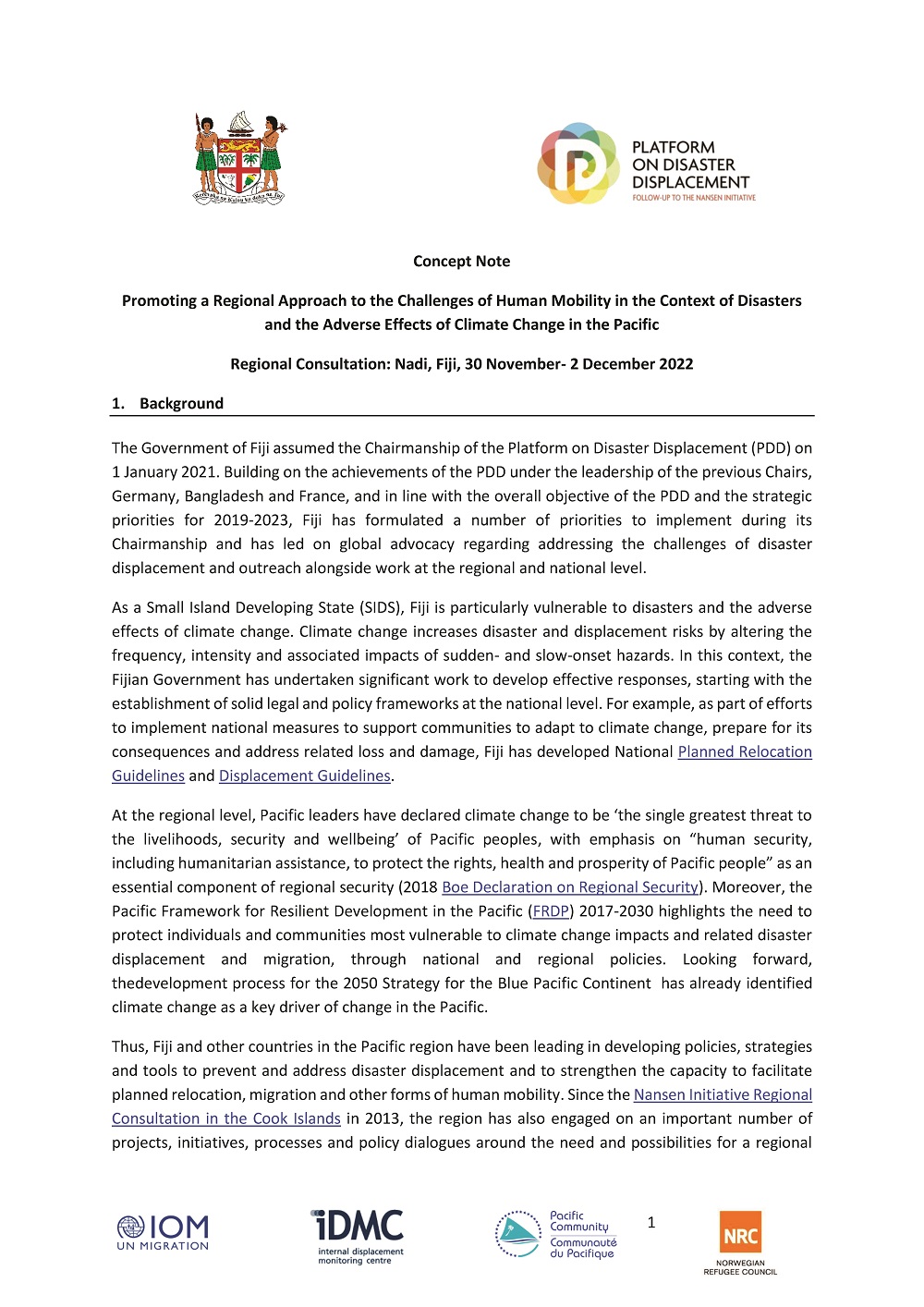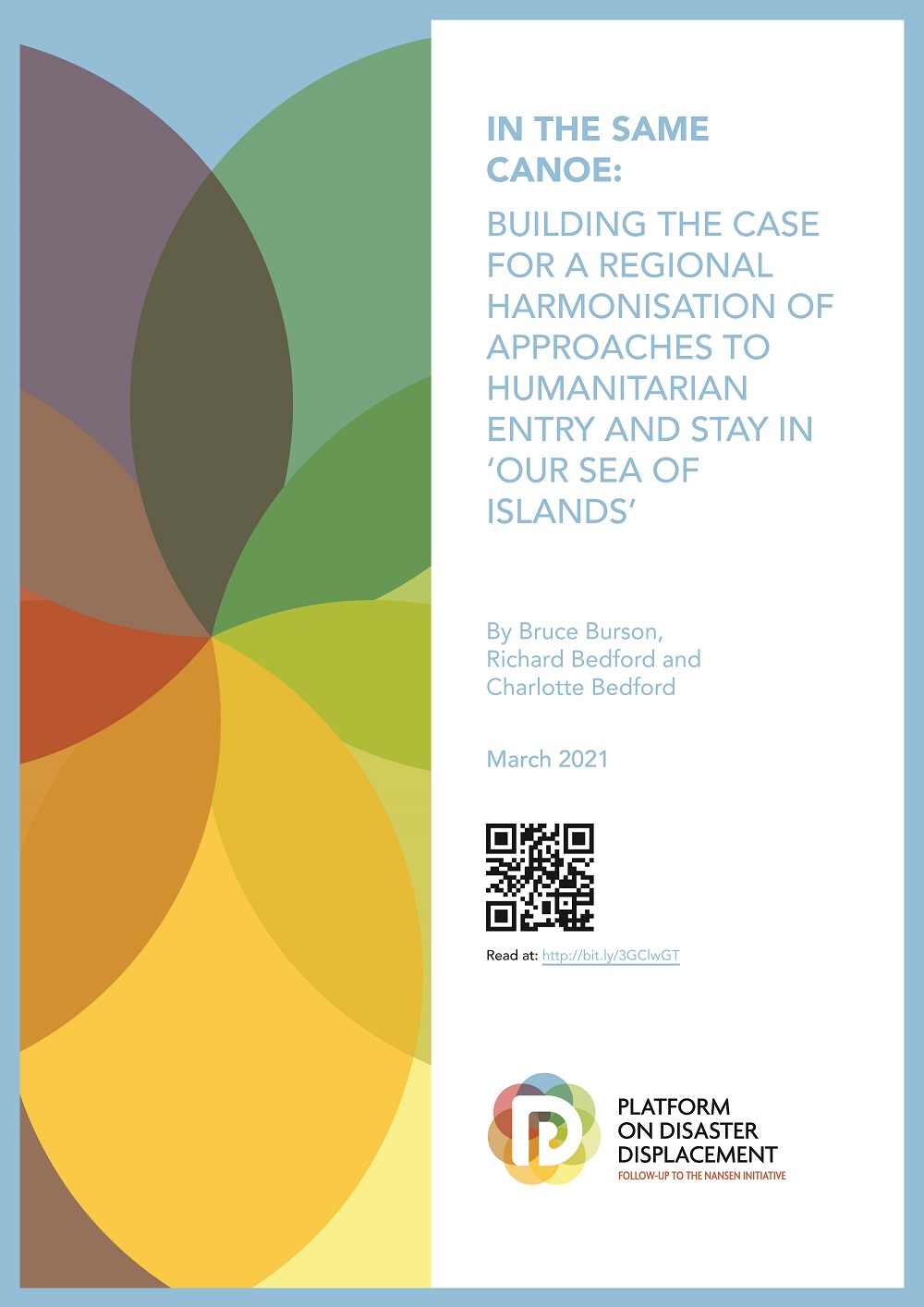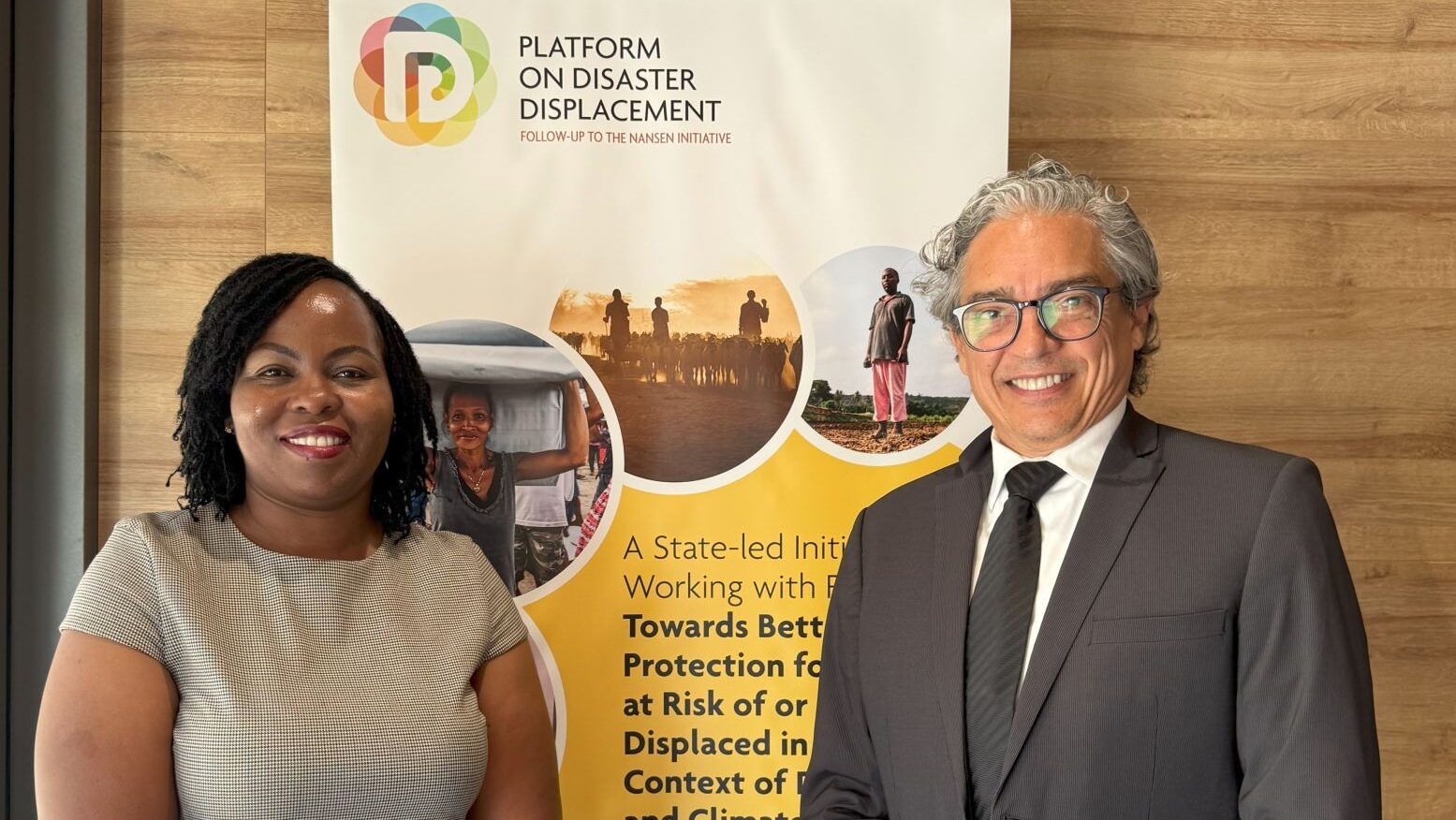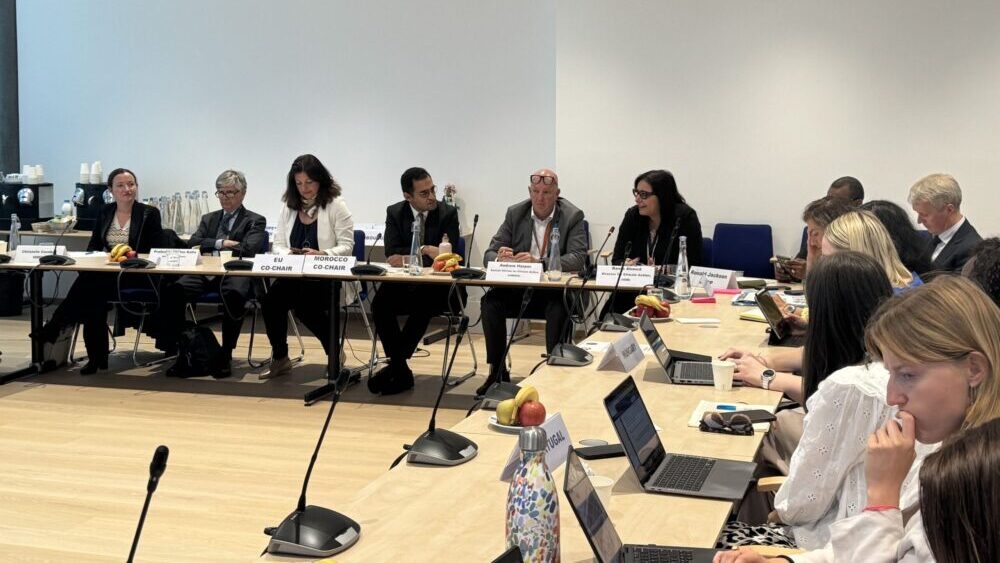Regional Consultation – Promoting a Regional Approach to Human Mobility in the Context of Disasters and Climate Change in the Pacific
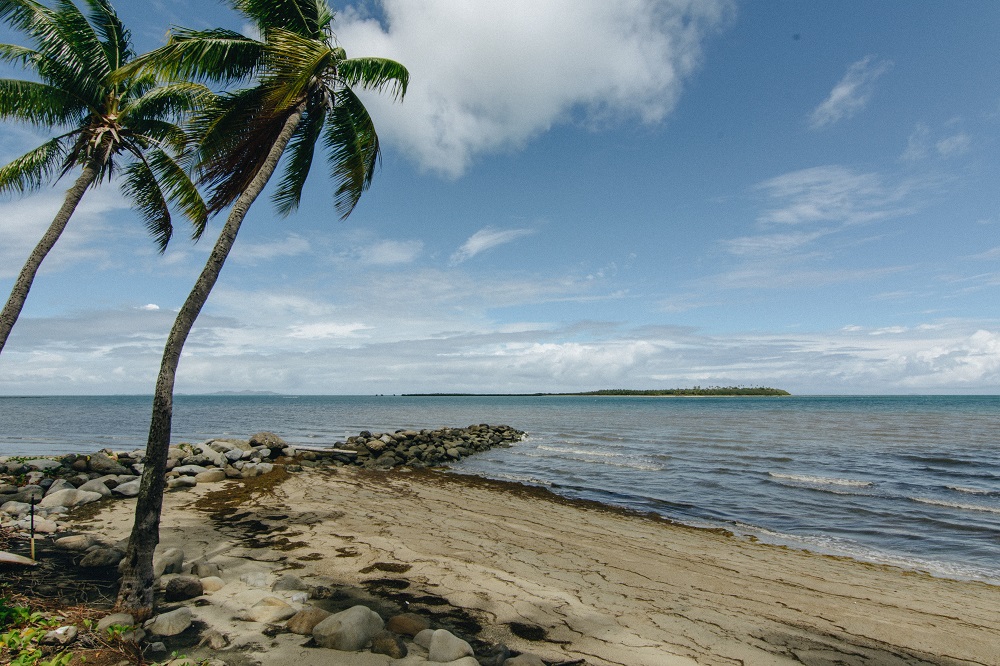
Promoting a Regional Approach to Human Mobility
in the Context of Disasters and Climate Change in the Pacific
30 November – 2 December 2022
Nadi, Fiji
1. Background
The Government of Fiji assumed the Chairmanship of the Platform on Disaster Displacement (PDD) on 1 January 2021. Building on the achievements of the PDD under the leadership of the previous Chairs, Germany, Bangladesh and France, and in line with the overall objective of the PDD and the strategic priorities for 2019-2023, Fiji has formulated a number of priorities to implement during its Chairmanship and has led on global advocacy regarding addressing the challenges of disaster displacement and outreach alongside work at the regional and national level.
As a Small Island Developing State (SIDS), Fiji is particularly vulnerable to disasters and the adverse effects of climate change. Climate change increases disaster and displacement risks by altering the frequency, intensity and associated impacts of sudden- and slow-onset hazards. In this context, the Fijian Government has undertaken significant work to develop effective responses, starting with the establishment of solid legal and policy frameworks at the national level. For example, as part of efforts to implement national measures to support communities to adapt to climate change, prepare for its consequences and address related loss and damage, Fiji has developed National Planned Relocation Guidelines and Displacement Guidelines.
At the regional level, Pacific leaders have declared climate change to be ‘the single greatest threat to the livelihoods, security and wellbeing’ of Pacific peoples, with emphasis on “human security, including humanitarian assistance, to protect the rights, health and prosperity of Pacific people” as an essential component of regional security (2018 Boe Declaration on Regional Security). Moreover, the Pacific Framework for Resilient Development in the Pacific (FRDP) 2017-2030 highlights the need to protect individuals and communities most vulnerable to climate change impacts and related disaster displacement and migration, through national and regional policies. Looking forward, the development process for the 2050 Strategy for the Blue Pacific Continent has already identified climate change as a key driver of change in the Pacific
Thus, Fiji and other countries in the Pacific region have been leading in developing policies, strategies and tools to prevent and address disaster displacement and to strengthen the capacity to facilitate planned relocation, migration and other forms of human mobility. Since the Nansen Initiative Regional Consultation in the Cook Islands in 2013, the region has also engaged on an important number of projects, initiatives, processes and policy dialogues around the need and possibilities for a regional approach to the challenges of human mobility in the context of disasters and the adverse effects of climate change.
For example, the Pacific Response to Disaster Displacement (PRDD) project, funded by the European Union and implemented by PDD, the Internal Displacement Monitoring Centre (IDMC) and the International Organization for Migration (IOM) has outlined the case for regional harmonization of approaches to humanitarian entry and stay as a core element of migration management in the context of disasters an climate change, developed tools to model disaster and displacement risks, supports operational preparedness and included human mobility challenges in disaster risk and climate change adaption planning. The Pacific Climate Change Migration and Human Security (PCCMHS) project led by IOM, and implemented together with other UN Agencies and the PDD, is funded by the UN Trust Fund for Human Security and the New Zealand Aid Programme and has started a process to develop a Pacific Regional Framework on Climate Mobility (Regional Framework).
COP27 is the 27th session of the Conference of the Parties (COP) to the United Nations Framework Convention on Climate Change (UNFCCC) which will take place in Sharm El-Sheikh, Egypt, from 7-18 November 2022. Egypt’s COP27 presidency notes that ‘addressing the climate crisis requires bold and rapid collective action‘ and that ‘the increasing frequency and intensity of extreme weather events is impacting the lives and livelihoods of millions of people‘. COP27 will focus on adaptation, mitigation, loss and damage, finance and collaboration.
The Fijian Chairmanship of the PDD officially ended on 30 June 2022, and the Government of Fiji would like to use this Regional Consultation to formally mark the handover of the Chairmanship of the PDD to the European Union (EU). The event will be held in Nadi, Fiji, from 30 November – 2 December 2022, and invite representatives of Pacific Island Countries and Territories (PICTs), PDD Steering Group members and key partners such as IDMC, IOM and UNHCR. The proposed title of the Regional Consultation is Promoting a Regional Approach to the Challenges of Human Mobility in the Context of Disasters and the Adverse Effects of Climate Change in the Pacific.
The Regional Consultation will be hosted by the Government of Fiji and co-organized with the PDD, IDMC, IOM, the Norwegian Refugee Council (NRC) and partners of the PCCMHS Project. It is generously supported with funding from the European Union and the government of Germany.
2. Objective of the Regional Consultation
The overall objective of the Regional Consultation is to share lessons learned and effective practices on averting, minimizing and addressing displacement in the context of disasters and the adverse effects of climate change, and to support ongoing efforts to develop national and regional approaches to addressing challenges related to displacement in the context of climate change in the Pacific. More specific objectives include:
- Mark the transition of the Fijian Chairmanship of the PDD to the EU;
- Take stock of lessons learned, share effective practices and present tools and outputs from the Pacific Response to Disaster Displacement (PRDD) project which officially concludes on 31 December 2022;
- Support and continue consultations among PICTs in the context of the PCCMHS project on the development of a Pacific Regional Framework on Climate Mobility (Regional Framework);
- Reflect on the relevance of displacement and human mobility in the context of ongoing global policy discussions on climate change adaptation and loss and damage, in particular under the UNFCC, with a focus on outcomes of COP27 and preparing for COP28;
- Officially launch the implementation of Fiji’s national workplan and workstreams under a PDD project funded by Norwegian Agency for Development Cooperation (Norad) on “Action and support to avert, minimize and address displacement related to the adverse effects of climate change”; Following the Regional Consultation, the Chair of the Regional Consultation, the Government of Fiji, will present a Chair’s Summary including key take-aways and recommendations including on identifying common human mobility challenges in the context of disasters and the adverse effects of climate change, and reflecting on how relevant stakeholders, including the PDD and its Steering Group members can strengthen efforts to address these challenges at the national, regional and international level.
3. Methodology and Expected Results
The consultation will consist of moderated technical segments, panel discussions, and break-out sessions with the participation of national governments, experts and representatives from international organisations, regional bodies and national civil society actors. There will be a field trip to view an example of Fiji’s efforts at addressing human mobility in the context of the adverse effects of climate change.
4. Practical and Organizational Information
Venue
Hilton Fiji Beach Resort and Spa, Denarau Island, Nadi, Fiji.
Participants
Government representatives from PICTs.
Platform on Disaster Displacement Steering Group Members (Argentina, Australia, Bangladesh, Brazil, Canada, Costa Rica, European Union (Chair), Fiji, France, Germany, Kenya (Vice-Chair), Madagascar, Maldives, Mexico, Morocco, Norway, Philippines, Senegal, Switzerland).
Partners of the PCCMHS Project: IOM, International Labour Organization (ILO) Office of the United Nations High Commissioner for Human Rights (OHCHR), United Nations Economic and Social Commission for Asia and the Pacific (UN-ESCAP), Pacific Islands Forum Secretariat (PIFS). Selected representatives of development partners, international organizations, NGOs, civil society, academic institutions and other key actors working on issues related to displacement, disaster risk reduction, disaster management, climate change adaptation, human rights protection, migration management, development and climate change.
Other administrative details
The organizers will cover the cost of travel and local hospitality for representatives from PICTs, SIDS, Least Developed Countries (LDCs) and developing countries, including representatives from Civil Society Organizations (CSOs). Representatives from other countries and International Organizations are required to defray their own expenses.
Download the Event Agenda
Download the Event Concept Note
Useful Links
The Pacific Response to Disaster Displacement (PRDD) project

